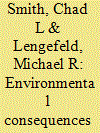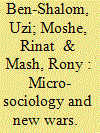|
|
|
Sort Order |
|
|
|
Items / Page
|
|
|
|
|
|
|
| Srl | Item |
| 1 |
ID:
173760


|
|
|
|
|
| Summary/Abstract |
The digital divide's implications on health inequality among American Military veterans has been discussed extensively in research; however, it remains unclear what is the association between Internet usage and health specifically among Veterans. We examine this question by addressing the growing digital gaps in the veteran population, looking at the association of Internet use and self-reported health. Using the National Survey of Veterans we find that compared to those who use the Internet daily, those who use the Internet less frequently have significantly higher odds of reporting “fair” or “poor” self-rated health. The significant association remained when demographic, socioeconomic, and military factors were controlled. While our results indicate that veterans that use the Internet more frequently report more favorable self-reported health, given our data we are unable to distinguish a causal relationship. We conclude by discussing potential policy interventions, targeting helping those who are left behind.
|
|
|
|
|
|
|
|
|
|
|
|
|
|
|
|
| 2 |
ID:
173759


|
|
|
|
|
| Summary/Abstract |
Warmaking and war preparation have changed significantly in the 21st century. A number of scholars have documented and analyzed these changes. Drawing on work focused upon “new war” and “new militarism,” we argue that one facet of these practices has received little attention—the environmental consequences of “new militarism.” Specifically, we contend that “asymmetric war” through the mechanism of risk-transfer militarism results in increased carbon emissions. Our analyses utilize fixed effects models for 126 countries using international panel data from 2000 to 2010. We sketch the differences in these outcomes for both developed and developing nations, contextualize carbon emissions within both times of economic prosperity and decline, provide evidence of the differential effects on carbon emissions by a nation’s world-systems standing, and provide empirical evidence of the rise of risk-transfer militarism and its negative effects on the environment.
|
|
|
|
|
|
|
|
|
|
|
|
|
|
|
|
| 3 |
ID:
173762


|
|
|
|
|
| Summary/Abstract |
This study explores the “black box” of face-to-face violence during terror attacks. It is based upon visual analysis of a representative sample of terror attacks that occurred in Israel during 2015–2016, a period which is labeled “The Intifada of Individuals.” We offer a new method for this purpose by using available materials that military sociologists can retrieve and employ when they use the “macro”-level framework in their study of “micro”-level actions. The abundance of audiovisual devices allows a new perspective of belligerent friction typical of “New Wars.” Our methodology includes a combination of video and audio materials from open sources. Our analysis untangles the complexities of belligerency by minimizing the overall occurrences to the actions of the antagonist, the disrupter, and the crowd. We discuss our understandings for policy making concerning armament of civilians and overcoming the manipulation of terror attacks by media, government, and terrorists.
|
|
|
|
|
|
|
|
|
|
|
|
|
|
|
|
| 4 |
ID:
173763


|
|
|
|
|
| Summary/Abstract |
There is little empirical evidence of the widely shared belief that most civilians know next to nothing about defense policy and armed forces. This article examines knowledge of defense policy in Germany and its determinants. The database is a public opinion survey from 2016. The survey included six questions on various aspects of knowledge of defense policy. Its results show that knowledge of defense policy is approximately on a level with general political knowledge in Germany. Determinants from the categories of resources and sociodemographics, motivations, and opportunity structures explain individual knowledge levels. Internal efficacy, interest in politics, the intention to vote, and the perception of the Bundeswehr’s presence in the media are among the most important predictors. These results indicate that the armed forces can bridge the gap between the public and the military, the civil–military gap, by being present in society and active in personal and mass media communication.
|
|
|
|
|
|
|
|
|
|
|
|
|
|
|
|
| 5 |
ID:
173758


|
|
|
|
|
| Summary/Abstract |
How did the U.S. Department of Defense (DoD) develop its torture program and, in so doing, stray so significantly from its existing standard operating procedures (SOPs) around humane prisoner treatment? This model of organizational decision-making examines both the ambiguous structural environment that interrogators faced after 9/11 and the ways in which actors used their agency to challenge the procedures and rules that had governed DoD decision-making and actions for more than six decades. By building off the work on organizational theorizing pioneered by Graham Allison and James March, this study process traces the ways in which the DoD’s institutional procedures protecting detainees were developed, challenged, and then ultimately reaffirmed. This research helps organizations ultimately understand the power—and the weaknesses—of their SOPs.
|
|
|
|
|
|
|
|
|
|
|
|
|
|
|
|
| 6 |
ID:
173761


|
|
|
|
|
| Summary/Abstract |
This article investigates the role of war experiences on voters and veterans’ party choices in postwar elections. The literature has looked at the relation between military experience and electoral behavior, and at the political consequences of war-related psychological distress, yet has never integrated the two. This article looks at the war experiences and specifically the development of war trauma on the likelihood of casting a vote for a nationalist party during a postwar election. Based on a 2003 survey of 1,000 Croatian voters, I find that veterans of Croatia’s war of independence are more likely to vote for nationalist parties. However, voters who showed signs of trauma were less likely to vote for these parties. In addition, veterans suffering from psychological trauma after the war were far less likely to vote for nationalist parties.
|
|
|
|
|
|
|
|
|
|
|
|
|
|
|
|
|
|
|
|
|